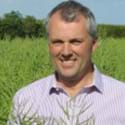Roy Ward Farms covers nearly 700 hectares in Lincoln and is owned and run by Andrew Ward. The farm supplies High Oleic Low Lenolenic (HOLL) rapeseed, which is processed into the oil blend used in McDonald’s restaurants.
The farm has always emphasized innovation in farm management and practices, and is committed to developing new machinery and techniques as a way of reducing inputs and tackling new and existing challenges. The farm’s biodiversity and soil health are also priorities for Andrew, as is the active involvement of his staff in running and developing the farm.
Key areas of sustainable practice
Red Tractor is a recognized farm assurance scheme that helps with product marketability. It ensures farm practices and management are in place to maintain product quality, traceability and environmental standards.
The GAFTA Trade Assurance Scheme (GTAS) is a HACCP-based scheme for companies in the grain and feed trade that provides customer confidence of the safe storage and handling of food and feed.
Although the farm only has a small team, Andrew appreciates the knowledge and experience of his staff and conducts regular meetings to discuss key management and operational decisions. Staff also have a formal annual performance review, which provides the opportunity to set objectives and ensure they are happy with conditions and their professional development.
In early February every year, the Green Area Index (GAI) and Soil Nitrogen Supply (SNS) are measured for every field. This enables a target yield to be set and provides information to help define timing and an optimum nitrogen application rate for the crop. The GAI is a measure of crop canopy that provides a basis for achieving the maximum potential yield at harvest by optimizing nitrogen requirements.
All fields are also sampled and analyzed to provide detailed digital soil nutrient maps that highlight any variations in phosphorus, potassium, magnesium and pH levels. This information provides data for improved management decisions and maps the variable application rates via the Global Positioning System (GPS) attached to the tractor and fertilizer spreader.
Using biosolids (treated sewage sludge) provides significant benefits, as the treated sewage has a nutrient value from nitrogen and phosphorus and adds organic matter to the soil. It also reduces purchases of artificial fertilizer.
Improving soil structure and quality is a key objective of the farm. All crop residues (straw and green manures) are chopped and incorporated into the soil and the farm has adopted a policy of minimal cultivations for crop establishment. These practices have benefited and increased soil organic matter (SOM) levels.
Andrew found existing single pass cultivators/drills created too much soil disturbance which increased grass weed problems. He adapted a Simba Solo cultivator, which builds on the single pass characteristics of soil cultivation and sowing, and uses it to deliver a targeted application of liquid fertilizer, as the seed is now deposited along the cultivated band.
Andrew is engaged with several industry bodies and associations and founded Forage Aid, which provides feed to livestock farmers affected by severe winter weather conditions.
The farm is a member of an environmental stewardship scheme and has established 6-meter grass and wildflower margins in most fields. Several of these are planted near to footpaths and main roads with the aim of improving the public’s perception of agriculture. The farm has also established feeding stations for farmland birds, including songbirds, grey partridge and pheasants, and does not undertake or allow any shooting of game birds on the land.
Photovoltaic panels have been installed on the grain store roof to provide a source of renewable energy. The electricity produced helps meet the farm’s requirements over summer and excess energy produced in the winter is supplied into the National Grid.
Learn more about Andrew Ward’s story
Explore the case study, where you’ll find extra details on how the farm has performed against the program’s good practice standards and criteria, what external research reveals about the producer's actions and how improved sustainability benefits them.

“Growing oilseed rape for McDonald’s gives me and my staff a huge amount of pride. I place great importance in forming strong relationships with the farming community, our customers and suppliers, and our work with McDonald’s serves as the perfect example of this. Our farm is driven by innovation and the application of science, and being selected as a Flagship Farmer recognizes and celebrates this commitment. With the popularity and scale of McDonald’s, we are finding other companies are wanting to be associated with us because of our connection.”


